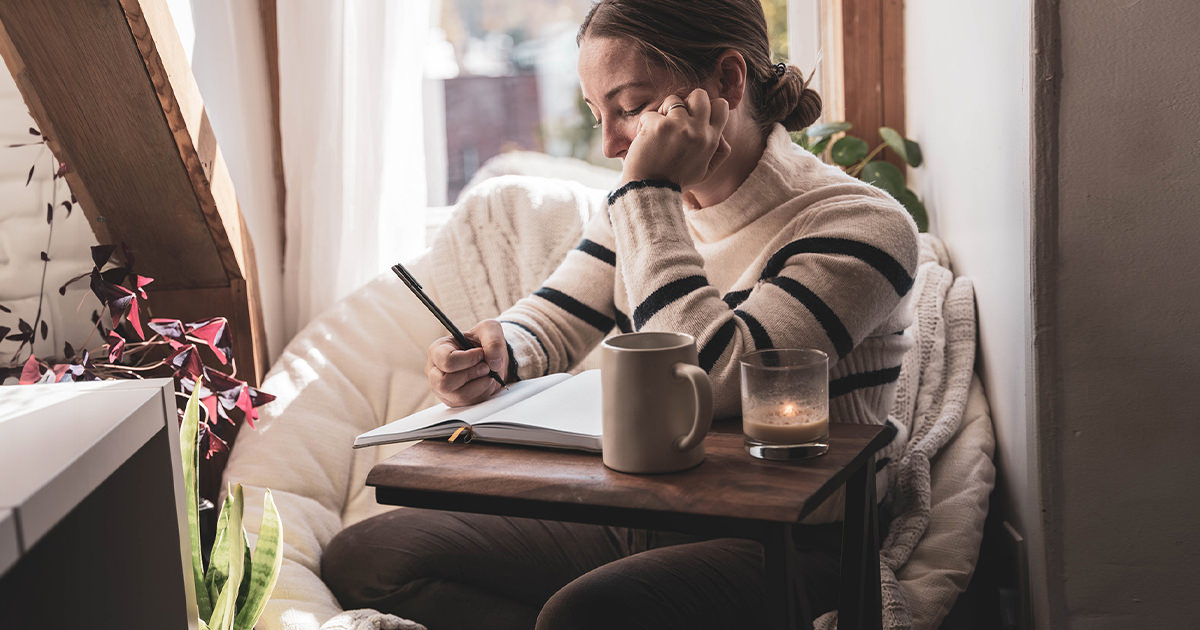What comes to mind when you think about therapy? Maybe what you picture is like something out of a TV show or movie: You lying on a couch. Your therapist sitting across from you in a leather chair. Or perhaps you have absolutely no idea what to expect. Either way, you might feel nervous about sharing your problems with a stranger.
While it can be nerve-wracking to open up to someone new, a therapist’s job isn’t to judge you. Their only goal is to support you and help you grow. No matter what you’re facing.
Learning about what to expect in therapy can help make the process less stressful. Read on to explore how we approach therapy at AbleTo, so you can get the most out of it.
How does therapy at AbleTo work?
AbleTo offers short-term, virtual cognitive behavioral therapy (CBT) that’s tailored to your needs. Here’s how it works:
You tell us about yourself
When you sign up for an AbleTo therapy program, we kick things off by learning more about you. This helps us confirm that therapy is the right AbleTo program for you. If it is, we’ll work with you to choose a therapist that best meets your needs. You’ll then schedule an initial consultation (IC) with that provider.
You attend your IC
During your IC, you’ll meet with your therapist for 60 minutes. They’ll use this time to learn about:
- You and your experiences
- What you’re struggling with
- How it’s affecting you
- Your accomplishments
- Your strengths
After your IC, you and your therapist will work together to tailor a program to your needs and goals.
You meet weekly with your therapist
Once you’re in therapy, you’ll meet with your therapist once a week for 8 weeks by phone or video for 45 minutes. Depending on your needs, you may also meet once a week for 45 minutes with a behavioral coach. They’ll help you move toward your goals.
During each session, you’ll have the undivided attention of your provider. Every AbleTo therapist is a licensed and highly trained mental health expert who cares about you and your well-being.
“Our therapists know that building a solid relationship keeps you engaged and motivated to reach your goals,” says AbleTo Program Advisor Giselle Alexander, LCSW.
Your therapist will tailor your sessions to you and your struggles. Expect to talk about your thoughts and feelings and how they affect you. Your therapist will help you set goals and track your progress.

Achieve your mental wellness goals
AbleTo programs give you 24/7 access to tools, activities, and content tailored to your needs. Sign up or log in to start exploring.

What’s cognitive behavioral therapy?
CBT is one of the most studied and effective forms of psychotherapy. It helps you understand the connection between your thoughts, emotions, and actions. This is the first step toward changing the unhelpful ones. You’ll learn coping, problem-solving, and self-care skills. And then you’ll start using them to create lasting change.
The best part? The skills you gain in therapy are life skills. You can use them in a variety of situations. This is one reason why research shows CBT can have a long-term impact. Even after therapy is over.
What are the benefits of therapy?
AbleTo therapy programs are proven to decrease stress, anxiety, and depression*. But therapy can also help you:
- Deal with relationship problems
- Improve your communication skills
- Navigate life transitions
- Live with a chronic illness
- Manage grief
Why are AbleTo therapy programs 8 weeks long?
Research shows CBT can help improve depression and anxiety symptoms for many within 6-8 weeks of treatment. “CBT is a targeted, intentional approach towards change,” says Alexander. “You’ll work with your therapist during each session to identify barriers to change and talk about what’s working and what’s not.”
Time-bound programs like this can also help make mental health care more affordable. “Our programs provide key skills that work for your busy lifestyle,” says Alexander. After 8 weeks of treatment, you’ll be better prepared to self-manage challenges going forward.
What happens at the end of 8 weeks? What if I need more support?
Our goal is to help you learn skills you need to feel better within 8 weeks. But if you don’t, you may be able to extend your program for a few additional weeks depending on your coverage.
Three months after your last therapy session, we’ll check in and see how you’re doing. Again, depending on your specific needs and your coverage, you may be eligible for a shorter therapy program called a “booster.” You might also be able to enroll in another 8-week program if you have a separate problem to address.
How can I know if therapy with AbleTo is right for me?
If you’re struggling with stress, anxiety, depression, or any of the other issues listed above, therapy with AbleTo might be right for you. But you don’t need a diagnosis to see one of our therapists. The first step is scheduling an IC. From there an AbleTo therapist will determine if our therapy programs are a good fit.
If at any point in your journey, you and/or your therapist decide AbleTo isn’t the best option for you, we’ll help you find the support you need.
How much do AbleTo’s therapy programs cost?
AbleTo is a benefit offered to people by their employer or health plan. Because of this, most people pay $0 for therapy. There may be co-pays, depending on your coverage. Contact your benefit provider for more information.
What to expect from therapy
Knowing what to expect can help you feel more prepared for therapy — which may also help you get the most out of it.
You’re going to feel feelings
Opening up to someone can be hard. You might feel embarrassed or awkward. You might laugh and cry all within the same session. That’s OK. Any and all feelings are welcome. There’s no one “right” reaction. Therapy is the perfect place to feel them all. So just go with it.
It’s not just talk
CBT involves more than just talking about your feelings. Learning coping skills, problem-solving strategies, and self care is foundational to CBT. Here are a few specific CBT skills you might practice in your AbleTo program:
- Self-monitoring: A form of personal reflection where you observe and record thoughts, emotions, and behaviors. This can help you identify triggers and patterns that positively or negatively impact your mental health.
- Relaxation: Body-focused skills and techniques that can help you cope with difficult emotions, self-soothe, and reduce feelings of stress.
- SMART goals: SMART goals are specific, measurable, achievable, relevant, and time-based. Setting them provides clear, structured milestones to help you monitor your progress, stay on track, and get where you want to be.
- Behavioral activation: The process of doing more healthy and rewarding activities to “activate” positive emotions. This includes finding activities you enjoy, setting goals that matter to you, and interacting with others in a positive way.
Therapy isn’t over when your session ends
CBT is meant to impact (and improve) your real life. Between sessions, it can be helpful to reflect on what you discussed and how it applies to your life. Your therapist may recommend activities or exercises for you to try outside of your session. If you need extra support, you’ll have 24/7 access to self-care tools, such as guided meditations, breathing exercises, and journals.
How to get the most out of therapy
You’ll get out of therapy what you put into it. To help ensure a positive experience, keep a few things in mind:
Be open to the process
It’s important to feel comfortable with your therapist. But remember, any relationship takes time to grow. After a few sessions, you should feel like your therapist is trustworthy and helpful. If you haven’t made a connection with your therapist after the first few sessions, please contact us at help@ableto.com. Or, for immediate assistance, call +1 (866) 287-1802 between 9am – 8pm ET. We’ll work with you to find a therapist that’s a good fit. Our programs are short, and we want you to have a positive experience.
Be honest with yourself and your therapist
Therapy sessions are confidential. It’s the ultimate safe space. The more you share with your therapist the better your therapist will be equipped to help you. Know that they won’t laugh at you, judge you, or share your secrets. Their goal is to help you.
If you feel uncomfortable being yourself or sharing everything, tell your therapist
If your therapist knows your limits, they can better support you as you move at your own pace. They won’t judge you no matter what you share — or don’t share.
Take time to prepare for your session
Virtual therapy is convenient (no commute needed). But being able to log in from anywhere can also open you up to distractions. We suggest logging into your session from a quiet, private place where you can focus free from distractions.
If you worked on assignments or activities since your last session, come prepared with feedback
It can also help to schedule therapy at a time when you’ll be able to decompress after your session is over.
Be patient and curious
Therapy takes a willingness to be open. You might encounter challenges, get frustrated, or feel like it’s not quite like what you thought it would be. Stick with it. You can unlock things you didn’t even know you were looking for.
Remind yourself it’s OK to be uncomfortable
If you’re uncomfortable with how your therapy is going, or with your therapist, it’s OK to ask questions. But remember, therapy is often uncomfortable. Your therapist will support you. But they will also challenge you so you can grow. Some days, you may leave therapy beaming. Other times, you may feel sad or upset. It’s all part of the process.
Taking the next step
It’s easy to think therapy is useful for other people, but not you. Maybe you feel like your problem isn’t a big deal. Or you’re worried about opening up to a stranger.
But therapy is for everyone. You might be amazed by how powerful a few small tweaks to your thinking or behavior can be. “Taking that first step can be scary,” says Alexander. “But it’s vital to creating the changes we sometimes need.”
Need some support?
AbleTo is here to help. From on-demand self care to virtual therapy and coaching, we make managing your mental wellness easy. Sign up and get the personalized support you deserve.
By Ashley Abramson
Ashley Abramson is a freelance writer based in Milwaukee, WI.
*AbleTo Book of Business Therapy+ DASS-21 Outcomes. February 2023; AbleTo Book of Business Therapy360 DASS-21 Outcomes. February 2023
Clinically reviewed by Hayley Quinn, PsyD.
Photos by Prostock-studio/Adobe Stock; Elle Mundus/iStock. Individuals in photographs do not represent AbleTo participants.
The information featured on this site is general in nature. The site provides health information designed to complement your personal health management. It does not provide medical advice or health services and is not meant to replace professional advice or imply coverage of specific clinical services or products. The inclusion of links to other websites does not imply any endorsement of the material on such websites.



